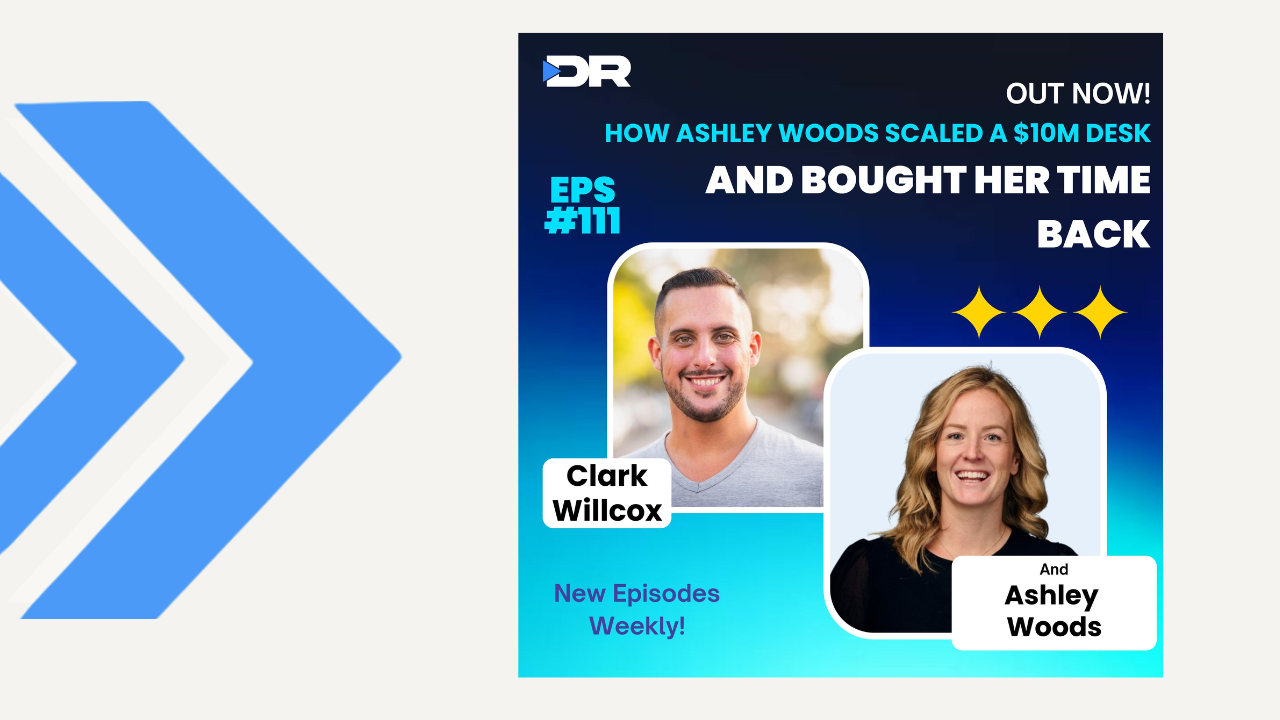Ashley Woods on Digital Recruiter Podcast: How to Scale a $10M Desk and Bring Your Time Back
In a recent episode of the Digital Recruiter Podcast, Ashley Woods, founder of Time Rich Recruiter and former top producer at T-Mache, shared her journey from burnout to building a sustainable $10 million recruiting desk. Her story offers valuable lessons for recruiters looking to scale their business without sacrificing their personal lives.
From Burnout to Balance: The Reality of Agency Recruiting
Ashley's path in recruiting wasn't always smooth. After starting at Allegis Group's Tech Systems division, she quickly rose through the ranks, becoming an account manager within just 10 months. However, success came at a cost. Working 80-100 hour weeks, Ashley experienced severe burnout that led her to leave recruiting entirely for tech sales.
"I was so burnt out that I didn't find anything fun anymore," Ashley recalled. "I stopped doing all the things that I loved because I was so tired."
This experience taught her a crucial lesson: high performance doesn't require endless hours. It requires the right systems, partnerships, and intentional time management.
The Foundation: Time and Energy Audits
Ashley's first step toward reclaiming her time was conducting comprehensive time and energy audits. She recommends recruiters track every minute of their day for two weeks, then color-code tasks based on energy levels—green for energizing activities, red for draining ones.
The goal? Eliminate or delegate the "red" activities that drain your energy without moving you closer to revenue. Ashley identifies sourcing, workflow tasks, and repetitive email communications as prime candidates for automation or delegation.
Key Tasks to Delegate or Automate
- Sourcing and outreach: Automate candidate nurturing sequences and initial outreach using tools and partnerships rather than manual effort.
- Repetitive communications: If you write the same email twice, create a template or automation for it.
- Administrative workflows: Anything that doesn't require human connection should be systematized.
The Power of Partnerships Over 360 Recruiting
One of Ashley's most contrarian insights is her stance on 360 recruiting—the practice of handling both client development and candidate recruitment yourself. Instead, she advocates for strategic partnerships.
"There is nothing quicker to burnout than 360ing your own desk," Ashley explained. "You could be good at both, but you're not gonna be an expert in both."
At her peak, Ashley had five full-time recruiters working for her while she focused on client relationships and business development. This partnership model allowed her to scale beyond what she could accomplish alone while maintaining work-life balance.
Working Smarter: The Four-Hour Focused Work Day
Ashley is a strong advocate for working less—but more intentionally. She recommends recruiters focus on three to four hours of deep, uninterrupted work daily, organized around activities "closest to the dollar."
How to Organize Your Day
- Start with revenue-generating activities: What deals are closest to closing? What client conversations will move the needle today?
- Time block ruthlessly: Eliminate notifications and distractions during your focused work periods.
- Embrace flexibility: Own your schedule rather than apologizing for it. If you're at the beach when a client calls, embrace it as part of your brand.
- Build in recovery: After intense project periods, schedule downtime to recharge.
"Nobody, no interruptions, block your notifications, your distractions, and then ebbs and flows," Ashley said. "There are gonna be instances where you're gonna have to hit hard... recover from that the next week."
Leveraging AI and Custom GPTs
Ashley has embraced AI tools to enhance her productivity. One of her most effective strategies is recording client calls and feeding them into custom GPT models to analyze trends and patterns. This allows her to provide data-driven insights to clients while saving hours of manual analysis.
The key is automating anything that doesn't require human connection while enhancing the activities that do.
Mindset Shifts for Sustainable Success
Beyond tactics and systems, Ashley emphasized the importance of personal development and mindset work. She recently attended Tony Robbins' Advanced Business Mastery event and discovered Dr. Benjamin Hardy's book "The Science of Scaling," which she highly recommends.
The concept that resonated most with her was setting "impossible goals"—ambitious targets that force you to evolve into the person capable of achieving them. Rather than setting a 30-year goal, Ashley suggests compressing it to seven years. This urgency fundamentally changes how you approach your daily work.
The Future of Recruiting
Despite doom-and-gloom predictions about AI replacing recruiters, Ashley remains optimistic about the industry's future.
"We're going into a really exciting time for recruitment," she said. "Traditional agencies are not dying... be open and just learn. Knowledge is power."
The recruiters who will thrive are those who embrace change, invest in their own development, and build sustainable systems that allow them to work smarter rather than harder.
Final Thoughts
Ashley's journey from burned-out agency recruiter to time-rich entrepreneur offers a blueprint for building a successful recruiting business without sacrificing your personal life. The keys are conducting honest audits of your time and energy, delegating or automating low-value tasks, building strategic partnerships, and maintaining focused work periods.
Most importantly, she reminds recruiters to stop being afraid to invest in themselves. "I've never met a group of people who have such high earning potential that don't want to reinvest back in themselves," Ashley noted.
Whether you're just starting out or looking to scale your existing desk, Ashley's approach proves that sustainable success is possible — you just need the right systems, partnerships, and mindset to make it happen.

